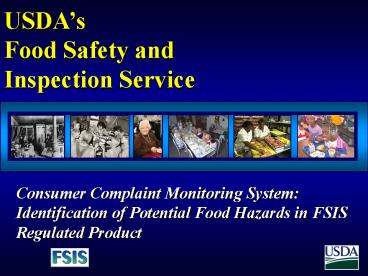Food Security - PowerPoint PPT Presentation
1 / 29
Title: Food Security
1
USDAs Food Safety and Inspection Service
Consumer Complaint Monitoring System
Identification of Potential Food Hazards in FSIS
Regulated Product
2
FSIS Mission
The Food Safety and Inspection Service protects
consumers by ensuring that meat, poultry, and egg
products are safe, wholesome, and accurately
labeled.
3
FSIS Responsibility
Jurisdiction over products that generate more
than 120 billion in sales annually.
4
History of FSIS A Science Based-Inspection System
? On July 25, 1996, FSIS issued its landmark
rule, Pathogen Reduction/Hazard Analysis and
Critical Control Point (HACCP) Systems.
? The rule focuses on the prevention and
reduction of microbial pathogens on raw products
that can cause illness.
5
History of FSIS A Science Based-Inspection System
- HACCP clarifies the respective
- roles of government and industry.
- Industry is accountable for
- producing safe food.
- Government is responsible for setting
- appropriate food safety standards,
- maintaining vigorous inspection
- oversight to ensure those standards are
- met, and maintaining a strong
- enforcement program to deal with plants
- that do not meet regulatory standards.
6
FSIS has a dedicated and diverse workforce that
vigilantly protects the meat, poultry and egg
products supply.
An inspection force of more than 7,600 deployed
throughout the United States
Inspectors present at various import stations
every day
Inspectors present in 6,500 plants every day
7
FSIS Regulates The Following
8
FSIS Statutory Authorities
9
To protect the health of the public, public
health authorities might need to obtain
information related to the individuals affected
by a disease
- 45 CFR 164.512(b)
10
Food Safety v. Food Security
- Food Safety Unintentional contamination of food.
- Food Security Intentional contamination of food
- Includes additional factors
- Physical Security
- Surveillance and Monitoring
- Personnel Security
- Emergency Response
11
as we consider bioterrorism, we are most
vulnerable in our food supply. Senator Bill
Frist, MD
12
Why Attack the Food Supply?
- Easy target
- 100 people eat everyday
- Can cause sickness and death
- Can cause disruptions without deaths
- Can destroy brand names
- Economic gains on futures
- Difficult to distinguish between intentional
- deliberate contamination designed to harm
- people and that which occurs unintentionally
13
Terrorist Attacks Require
- Behavioral Resolve (desire)
- Technical Feasibility (material)
- Operational Practicality (ability)
14
For someone to successfully tamper with a
foodstuff they must
- Have access to it for sufficient time
- Be technically capable of introducing a
- contaminant
- Be able to perform the operation without
- discovery
- Be competent enough to prevent dectection of
- the adulterated product down stream in the
- production's distribution life cycle.
15
U.S. Food Safety System
- System was originally designed to detect and
contain accidental contamination events. - Changes are being made to address possible
deliberate contamination events. - Multiple points of access in the farm-to-table
continuum must be monitored.
16
Consumer Complaint Monitoring System
- An electronic database used to record, triage,
coordinate, and track all consumer complaints
reported to the Food Safety and Inspection
Service implemented Nov. 2001. - Goals of CCMS
- Protection of public health by identifying food
hazards - Support and augment homeland security
17
Areas of Consideration
- Pre-Production
- Production
- Post-Production
- Prevention
- Early Detection
- Containment
- Mitigation short term
- Remediation long term
18
Current Consumer Complaint Monitoring System
- Primary Data Collection
- Food Safety and Inspection Service district
offices - 1-800 Meat and Poultry Hotline
- Every complaint is triaged by a United States
Public Health Service Nurse - Current search capabilities
- identification of similar complaints through
product brand, product name, and establishment
number
19
Multidimensional Relationships
- Symptoms/onset times
- Similar to other complainants?
- Reflective of a certain species?
- Chemical properties of alleged contaminant
- Environmental considerations
- Geo-Temporal Relationships
- Is it strange?
20
Informatics Challenges
- Multiplicity of database systems that do not
communicate at all or not well - Receipt of data from states and laboratories is
not timely - Cumbersome navigation overwhelming
- System not using state-of -the -art technology
21
Surveillance Data sitehttp//www.cdc.gov/ncidod/
dbmd/foodnet/foodnet.htm
22
Information System Functions Necessary for Public
Health Preparedness and Response
- Preparedness requires that all partners are part
of a system - Surveillance data analysis--event detection and
management - Notification--rapid alerting
23
System Platform will be Based on Standards
- Use national data and information system
standards - Standards adopted by human and veterinary
Medicine - HIPAA compliant
24
Gaining Actionable Intelligence
- Full schema
- Includes necessary information for a full
translational database - Secondary schema constructed by queries from the
to the full schema - Only information that is useful from a
statistical perspective - Only information a contractor is allowed to see
25
Gaining Actionable Intelligence
- CMU will run raw data through an FSIS specific
version of WSAREand see what happens - Primary idea is to identify unusual things in
recent data. - Specific purpose may not meet FSIS requirements
- Combine with other techniques
26
Biological Agents
- Review lists of biological agents
- CDCs A, B, C list, NATO and DTRA lists as
possible sources (non-classified) - Will review behavior of agents and people in past
known outbreaks - Attempt to identify how the threat will differ if
it occurs naturally vs. intentionally and how it
would appear in commercial products
27
Noise
- Train field officers on collecting clean data
- Use exponential, linear, and moving average
filters - Identify confounders and noise
28
In Conclusion
- The Consumer Complaint Monitoring System will
adopt and implement standards-based, integrated,
interoperable information technology to enhance
public health practice - This will result in progress towards identifying
and mitigating food hazards in commerce
29
Food Safety and Inspection Service
www.fsis.usda.gov































